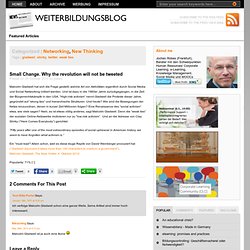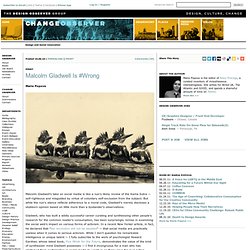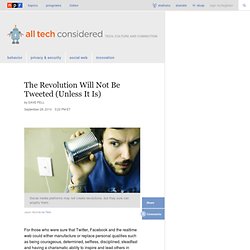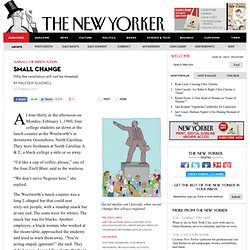

Small Change. Why the revolution will not be tweeted Small Change.

Why the revolution will not be tweeted Posted on 05 October 2010 by jrobes Malcolm Gladwell hat sich die Frage gestellt, welche Art von Aktivitäten eigentlich durch Social Media und Social Networking initiiert werden. Und ist dazu in die 1960er Jahre zurückgegangen, in die Zeit der Bürgerrechtskämpfe in den USA. “High-risk activism” nennt Gladwell die Proteste dieser Jahre, gegründet auf “strong ties” und hierarchische Strukturen. “Fifty years after one of the most extraordinary episodes of social upheaval in American history, we seem to have forgotten what activism is.” Ein “must read”! Popularity: 71% [?] Search - #stuttgart21. Search - #activism. Search - #s21. Search - #Parkschützer. Your (Brilliant) Responses to Gladwell on Social Media and Activism - Alexis Madrigal - Technology. The comments in response to my thoughts on Malcolm Gladwell's latest New Yorker piece about social media and activism are so extraordinary that they deserve their own post.

Here are highlights, but in situ. It's great. I love being shown up by our readers. These comments convince me that we're on the right track here on the Technology channel. Because when I read this conversation, I see a real community developing that's dedicated to thinking seriously, historically, and politically about technological issues. Cynic provides great context: The key to Gladwell's error lies in the examples he offers. Tim Carmody just nails that movements have always been built on weak and strong ties: Finally, you can't say that the weak ties in the Civil Rights movement weren't valuable.
David Dobbs provides a counterexample and points Gladwell cherry picked: Malcolm Gladwell Is #Wrong. Essay Maria Popova Malcolm Gladwell's take on social media is like a nun's likely review of the Kama Sutra — self-righteous and misguided by virtue of voluntary self-exclusion from the subject.

Sorry, Malcolm Gladwell, the revolution may well be tweeted. For a man who has devoted a significant part of his life to documenting "how little things can make a big difference", Malcolm Gladwell is surprisingly dismissive of the power of social networking to effect change.

In the latest issue of the New Yorker, he writes that the role played by Facebook and Twitter in recent protests and revolutions has been greatly exaggerated. Gladwell's argument is that social networks encourage a lazy activism that will only extend as far as "liking" a cause but not actually doing anything about it. This is because social networks are built around weak ties, where real activism needs strong bonds. Citing the American example, he points out that "events in the early 1960s became a civil-rights war that engulfed the South for the rest of the decade – and it happened without email, texting, Facebook, or Twitter. " The Revolution Will Not Be Tweeted (Unless It Is) : All Tech Considered.
Hide captionSocial media platforms may not create revolutions, but they sure can amplify them.

Jason Nicholls/via Flickr For those who were sure that Twitter, Facebook and the realtime web could either manufacture or replace personal qualities such as being courageous, determined, selfless, disciplined, steadfast and having a charismatic ability to inspire and lead others in moments of great historical importance, I’ve got some bad news. It turns out that’s not case. In his recent New Yorker piece, Small Change, Malcolm Gladwell argues that the social web does not fundamentally change the nature of revolutions. Kester Brewin » ‘The Revolution will not be Tweeted’ Excellent piece by Malcolm Gladwell in the New Yorker, casting a sceptical eye over the optimistic view that social networks can and do lead to increased social action.

His argument is not that they cannot have a good impact, but that the sort of impact they might have is very different from the hard work of political activism that brought about the end to segregation. Old style activism depended on ‘strong ties’ – people who probably knew one another, and were very committed to a single cause, with their lives and values tied up in it. Whereas… The kind of activism associated with social media isn’t like this at all. The platforms of social media are built around weak ties. But weak ties rarely lead to high-risk activism. Donating bone marrow isn’t a trivial matter. His conclusion is something we need to take careful note of: 3quarksdaily. Twitter, Facebook, and social activism. At four-thirty in the afternoon on Monday, February 1, 1960, four college students sat down at the lunch counter at the Woolworth’s in downtown Greensboro, North Carolina.

They were freshmen at North Carolina A. & T., a black college a mile or so away. “I’d like a cup of coffee, please,” one of the four, Ezell Blair, said to the waitress. “We don’t serve Negroes here,” she replied. The Woolworth’s lunch counter was a long L-shaped bar that could seat sixty-six people, with a standup snack bar at one end.
The seats were for whites. By next morning, the protest had grown to twenty-seven men and four women, most from the same dormitory as the original four. Podsafe Audio - Podcast Music for the Revolution: our stations. Situationist international online. Wissenschaftliche Arbeiten.